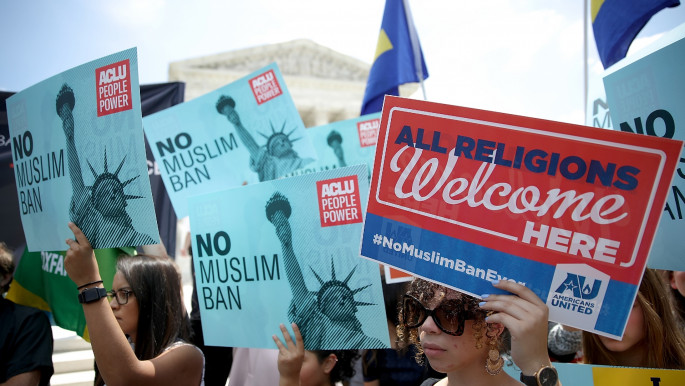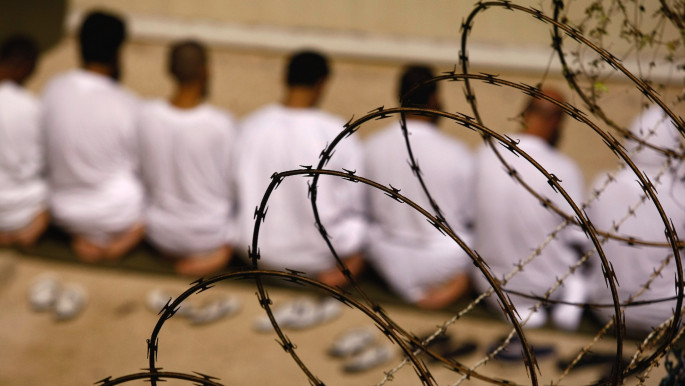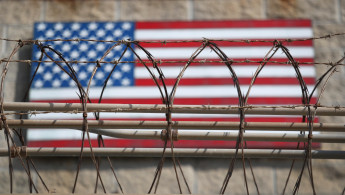Can Biden fulfil Obama's promise of closing Guantanamo Bay?
In a written testimony for his senate confirmation last month, Defence Secretary Lloyd Austin stated that it was time to close Guantanamo. On Friday, the White House announced that it was launching a review of the prison, with the aim of closing it.
"It's extremely important and absolutely necessary to have a change in policy. The US needs to reset its relations with the rest of the world, especially the Muslim world," Daphne Eviatar, director of security and human rights at Amnesty International USA, told The New Arab.
"It has to denounce the idea of indefinite detention. In the US, Guantanamo has become a symbol of Islamophobia. It's all Muslim men that are imprisoned there. The US is talking a lot right now about racism and white supremacy. We've got to see Guantanamo as a symbol and an outcome of that. It's something we wouldn't have otherwise."
This is the concern for advocates around the world, many of whom see the existence of Guantanamo Bay as a symbol of an unjust legal system for foreign – specifically Muslim – detainees that has had ramifications throughout the world.
It has been used as an excuse for the mistreatment of prisoners in different countries - al-Qaeda also used it in their recruitment videos - and more generally it has been held up as a prime example of America's violations of democratic legal norms.
 |
It's extremely important and absolutely necessary to have a change in policy. The US needs to reset its relations with the rest of the world, especially the Muslim world |  |
The location itself, at a US military base in Cuba leased for around $4,000 per year (cheques that Havana refuses to cash), in a country that is under a US economic embargo and has no direct flights from the US except to Guantanamo, a presence that Cuba describes as illegal, is among the least controversial aspects of this open-air prison.
Now in its 20th year, having held nearly 800 men from over 50 countries, it has seen a number of serious allegations. These include torture (possibly leading to coerced confessions), force-feeding, and sexual violations by prison guards. These are all in addition to an absence of due process, violating the US constitution and international law. The majority of the inmates have not been charged with a crime.
 |
|
| Read more: The Muslim travel ban is over. What happens now? |
Nevertheless, a 2019 report by The New York Times found that the US pays $13 million per prisoner per year to keep Guantanamo running, far more than any of its maximum-security domestic prisons.
Recent discussions of civil rights and criminal justice reform in the US have drawn renewed attention to long-standing controversial policies, such as indefinite detention at Guantanamo.
"Its place is in a broader conversation on decarceration and how the government uses money in what is a deeply flawed legal system. It should be part of a bigger conversation on civil rights and justice," Aliya Hussain, advocacy program manager at the Center for Constitutional Rights, tells The New Arab.
"The overarching theme is that our clients want to make sure people haven't forgotten about them," says Hussain, who travelled with her colleagues regularly to Guantanamo until the outbreak of coronavirus pandemic.
"They want to build a life. That's what they're trying to achieve. Nineteen years is a long time to be imprisoned. There is of course despair. Many men are worried that day won't come. They're holding onto hope. Many of them miss their families, whether it's their aging parents, wives or siblings."
 |
Advocates are now looking to the Biden administration to undo at least 20 years of discriminatory practices |  |
It was one of former President Barack Obama's main campaign promises to close Guantanamo. He made several serious attempts, but each time he was met with strong resistance from the Republican-led congress.
Though a general consensus has only increased over the years that the facility should close, some opposition remains. "The Democrats' obsession with bringing terrorists into Americans' backyards is bizarre, misguided, and dangerous," said Texas Republican Senator John Cornyn after the White House announcement of the review on Friday. "Just like with President Obama, Republicans will fight it tooth and nail."
 |
|
| Read more: Biden must succeed where Obama did not and close Guantanamo |
Towards the end of his second term, Obama seemed to resign himself to the idea that Guantanamo would not close under his watch. When Donald Trump took office four years ago, he made it clear that it would remain open, stating that he would fill it with "some bad dudes." Instead, during his term, one inmate was released, bringing the number from 41 to 40.
With Biden now in office, there appears to be a chance for him to fulfil his former boss's campaign promise – one that was made in the spirit of attempting to recover from the injustices of the war on terror. Instead, important anti-Muslim policies remained in place under Obama, and more were added under Trump. Advocates are now looking to the Biden administration to undo at least 20 years of discriminatory practices.
With strong public support for its closure and with 40 detainees remaining (six of whom have been cleared for release), few obstacles remain to close Guantanamo. At this point, as long as all of their releases are secured with a safe destination country, there would be no need for a formal closure of the detention centre. Still, the full closure of the facility could be an important step in healing a nearly 20-year-old wound.
"Even if all the people currently detained are released, formally closing it would heal a wound on the American psyche," says Matthew Callahan, a senior staff attorney at Muslim Advocates.
"This is not about guilt or innocence. It's about the right to a fair trial and the government's commitment to doing justice. Holding people without adjudicating their status for decades is not acceptable. We look forward to putting this behind us."
Brooke Anderson is a freelance journalist covering international politics, business and culture
Follow her on Twitter: @Brookethenews


![President Pezeshkian has denounced Israel's attacks on Lebanon [Getty]](/sites/default/files/styles/image_684x385/public/2173482924.jpeg?h=a5f2f23a&itok=q3evVtko)



 Follow the Middle East's top stories in English at The New Arab on Google News
Follow the Middle East's top stories in English at The New Arab on Google News


